Pros and Cons of Buying Leasehold Properties
“Leasehold” refers to when a property purchaser buys the buildings and other structures on a property, but the land itself remains the property of the original owner. The purchaser is effectively renting the land from the owner. This sort of arrangement is often shunned for its reputation for getting complicated when it comes to legal matters. If you’re in doubt, get in touch with us to find out more about the areas of property law relating to leaseholds. In the meantime, consider some of the general advantages and disadvantages of buying leasehold properties below.
PROS
Leasehold Property is Cheaper
Because you’re buying the building and leaving the land to the owner, the cost of purchasing leasehold property is much cheaper than buying a freehold property. Depending on the length and terms of the agreement, buying leasehold can end up being cheaper than renting outright – particularly for buyers looking for property in affluent areas of the city.
An Alternative Finance Option
The value of a leasehold property is typically lower than it would be if the property were sold in a regular freehold arrangement. This means that if the terms of the lease allow it, the buyer can choose to purchase the entirety of the property (land included) at a lower per annum fee than the rate of a mortgage. However, each property agreement differs in terms and entitlements, so always make sure you have a specialist property lawyer look over the agreement if this is your intention.
Own Your Home
Leaseholds can be a good way to get into the property market and own your home without the cost and commitment of owning land. Because you own the building, you’re still free to make home improvements.
CONS
Rent is Continuously Re-assessed
While the land rent may be affordable at the time the leasehold agreement is made, it is typically re-assessed regularly to reflect the market value of the property. If the neighbourhood experiences a property boom, you could be tied to a ground rent you can’t afford to pay.
Higher Deposits, Difficult to Gain Finance
Leasehold properties generally require higher deposits than freehold properties and can be difficult to gain finance for due to the complicated terms. Always have a conveyancing solicitor look over your agreement to make the terms clear before going to your bank or lender.
No Benefit from Increase in Land Value
Because you don’t own the land in this arrangement, you do not benefit from any increases in land value. Instead, if the area becomes a hot property spot, the landowner benefits and you could end up paying higher rent.
While there are some benefits to buying a leasehold property, the complicated nature of the agreement means it’s easy for buyers to lose-out in the long run. It’s imperative that you engage a property lawyer to review and explain the terms of the contract before you commit to it. If you’re considering buying a leasehold property, get in touch with our property Lawyers at Home Transfer Centre to learn more. Call us on 0800 773 377 or send us a message online.
